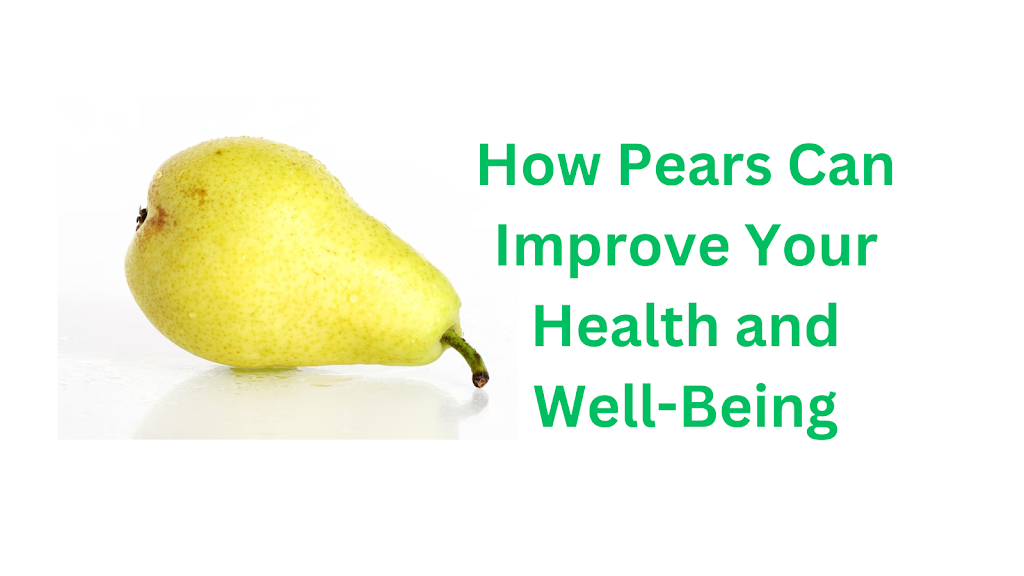How Pears Can Improve Your Health and Well-Being
Do you love eating pears? If so, then you’re in luck! Not only are these juicy fruits delicious and perfect for snacking, but they can also provide major health benefits. From improved immune function to better-looking skin, pears offer a whole range of advantages to your health and well-being.
And there’s no doubt that pears are excellent sources of vital nutrients like vitamin C, copper, and K—not to mention that they’re packed with dietary fiber to keep you feeling fuller longer. But what else can this humble fruit do for you? Let’s take a closer look at how pears can help improve your overall health and well-being.
Nutritional Benefits of Eating Pears
You may be surprised to hear what pears can do for your health and well-being. Natural, robust and low in calories, pears offer a number of important nutritional benefits. Rich in vitamins and minerals, these versatile fruits can be enjoyed as part of a balanced diet.
One large pear contains 24 percent of an adult’s daily requirement of Vitamin C and 12 percent Vitamin K. Meanwhile, they are a good source of copper, providing just over 10 percent of the recommended dietary allowance. Furthermore, they contain ample levels of dietary fiber, which help reduce blood cholesterol levels, prevent constipation and promote digestive health.
 |
| How Pears Can Improve Your Health and Well-Being |
Pears are also packed with polyphenols—naturally occurring micronutrients with powerful antioxidant properties that help protect against cellular damage caused by free radicals—and prebiotic fiber to nourish beneficial gut bacteria. Plus, they are virtually fat-free and sodium-free! All these factors make pears an ideal choice for those looking to maintain their health naturally.
How Pears Help Control Blood Sugar
Did you know that pears are incredibly helpful in regulating blood sugar levels? This is great news for anyone living with diabetes, as high blood sugar can cause a host of life-threatening complications.
When you eat a pear, the fiber in it helps to break down carbohydrates more slowly. The result is a gradual rise and fall of your blood sugar, allowing your body to maintain an even keel. Studies have also found that pears contain components which can help your cells more readily absorb glucose.
Plus, pears are low-calorie snacks that are chock full of vitamins and minerals like vitamin C, iron, and calcium. Eating pears on the regular can help you reach the recommended daily values of these important nutrients without putting yourself at risk for weight gain or other heart health issues.
How Pears Can Help Lower Cholesterol
You may not know it, but pears can help lower your cholesterol. What happens is that pears contain dietary fiber which binds to bile acids in your intestines which in turn helps reduce the amount of cholesterol your body absorbs. It’s like a triple threat—the soluble and insoluble fiber in pears not only helps reduce cholesterol, but it also helps regulate blood sugar levels and digestion.
Here’s how it works:
-
Soluble fiber found in pears help remove excess cholesterol from the digestive system, reducing your risk of cardiovascular disease
-
Insoluble fiber found in pears help speed up digestion, preventing constipation and helping you to feel fuller longer which can result in weight loss
-
Pectin found in pears is a powerful antioxidant that helps protect against cancer and reduce inflammation
The health benefits of these little gems don’t stop there. Pears are also good for regulating blood pressure, protecting against a number of diseases, and supporting healthy skin. So stock up on some pears during your next grocery run!
How Pears Improve Digestive Health
Another great benefit of pears is improved digestive health—and it makes sense when you think about how nutritious pears can be. For example, they’re packed with fiber, and different types of fiber have different effects on your gut.
The two types of fiber in pears are pectin and lignin—which both help to keep things moving along in your intestines. That means that they help with the digestion of other food, while also helping to promote regularity and prevent constipation.
Additionally, the beneficial bacteria in pears can help nourish your gut microbiome. By providing these beneficial bacteria with a source of food, it helps to promote the growth of “good” bacteria – which is important for a healthy digestive tract.
Let’s look at some of the specific benefits you can get from adding pears to your diet:
-
Aids digestion by providing fiber
-
Helps to keep you regular and reduce constipation
-
Strengthens your gut microbiome by providing beneficial bacteria
-
Boosts overall immune system health
Conclusion
Pears are a nutrient-packed powerhouse and can improve your health and wellbeing in various ways. Not only do they support healthy digestion, but they can help keep your heart healthy, too. Plus, they’re an excellent source of essential vitamins and minerals, and can even help boost your mood and energy levels.
Whether you eat them fresh, dried, or cooked, pears are an easy way to get the nutrition you need. Plus, they’re delicious, so it’s an easy way to make your meals more enjoyable. So why not give pears a try and see how they can help you feel your best?
